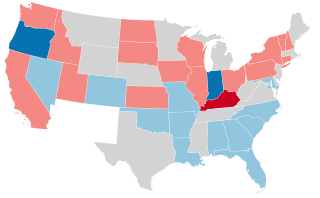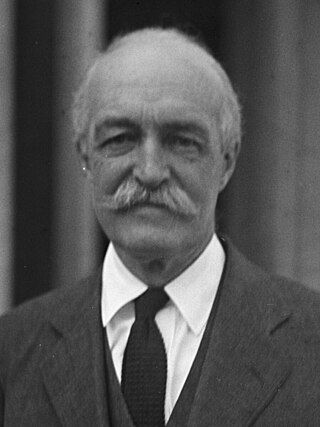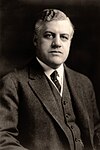
Gifford Pinchot was an American forester and politician. He served as the fourth chief of the U.S. Division of Forestry, as the first head of the United States Forest Service, and as the 28th governor of Pennsylvania. He was a member of the Republican Party for most of his life, though he joined the Progressive Party for a brief period.

The 1964 United States Senate elections were held on November 3. The 33 seats of Class 1 were contested in regular elections. Special elections were also held to fill vacancies. They coincided with the election of President Lyndon B. Johnson by an overwhelming majority, to a full term. His Democratic Party picked up a net two seats from the Republicans. As of 2023, this was the last time either party has had a two-thirds majority in the Senate, which allowed the Senate Democrats to override a veto, propose constitutional amendments, or convict and expel certain officials without any votes from Senate Republicans. However, internal divisions would have prevented the Democrats from having done so. The Senate election cycle coincided with Democratic gains in the House in the same year.

The 1922 United States Senate elections were elections that occurred in the middle of Republican President Warren G. Harding's term. The 32 seats of Class 1 were contested in regular elections, and special elections were held to fill vacancies. With the Republicans divided between conservative and progressive factions, the Democrats gained six net seats from the Republicans while the Farmer–Labor party gained one. The Republicans retained their Senate majority.

William Scott Vare was an American politician from Pennsylvania who served as a Republican member of the United States House of Representatives for Pennsylvania's 1st congressional district from 1912 to 1927. He also served as a member of the Pennsylvania State Senate from the 1st Senatorial District from 1922 to 1923. He won election to the United States Senate for Pennsylvania in 1926 but was never seated and was eventually removed in 1929 due to allegations of corruption and voter fraud.

Boies Penrose was an American politician from Philadelphia, Pennsylvania, who served as a Republican member of the United States Senate for Pennsylvania from 1897 to 1921. He served as a member of the Pennsylvania House of Representatives for the Philadelphia County district in 1885. He served as a member of the Pennsylvania State Senate for the 6th district in 1897 and as President pro tempore of the Pennsylvania Senate from 1889 to 1891.

The 1908–09 United States Senate elections were held on various dates in various states. As these U.S. Senate elections were prior to the ratification of the Seventeenth Amendment in 1913, senators were primarily chosen by state legislatures. Senators were elected over a wide range of time throughout 1906 and 1907, and a seat may have been filled months late or remained vacant due to legislative deadlock. However, some states had already begun direct elections during this time. Oregon pioneered direct election and experimented with different measures over several years until it succeeded in 1907. Soon after, Nebraska followed suit and laid the foundation for other states to adopt measures reflecting the people's will. By 1912, as many as 29 states elected senators either as nominees of their party's primary or in conjunction with a general election.

The 2000 United States Senate election in Pennsylvania was held on November 7, 2000 during a year which coincided with a United States presidential election in which Pennsylvania was viewed as a swing state. Pennsylvania was one of four states that elected Republican Senators despite being won by Al Gore in the concurrent presidential election, the others being Maine, Rhode Island and Vermont.

The 1896–97 United States Senate elections were held on various dates in various states. As these U.S. Senate elections were prior to the ratification of the Seventeenth Amendment in 1913, senators were chosen by state legislatures. Senators were elected over a wide range of time throughout 1896 and 1897, and a seat may have been filled months late or remained vacant due to legislative deadlock. In these elections, terms were up for the senators in Class 3.

The 1902–03 United States Senate elections were held on various dates in various states. As these U.S. Senate elections were prior to the ratification of the Seventeenth Amendment in 1913, senators were chosen by state legislatures. Senators were elected over a wide range of time throughout 1902 and 1903, and a seat may have been filled months late or remained vacant due to legislative deadlock. In these elections, terms were up for the senators in Class 3.

The 1892–93 United States Senate elections were held on various dates in various states, coinciding with former Democratic President Grover Cleveland's return to power. As these U.S. Senate elections were prior to the ratification of the Seventeenth Amendment in 1913, senators were chosen by state legislatures. Senators were elected over a wide range of time throughout 1892 and 1893, and a seat may have been filled months late or remained vacant due to legislative deadlock. In these elections, terms were up for the senators in Class 1.

The 1920 United States Senate election in Pennsylvania was held on November 2, 1920. Incumbent Republican U.S. Senator Boies Penrose successfully sought re-election to another term, defeating Democratic nominee John A. Farrell.

The 1926 United States Senate election in Pennsylvania was held on November 2, 1926. Incumbent Republican George W. Pepper, who was appointed following the death of Boies Penrose, was defeated for re-nomination by William Scott Vare. Vare won the election, defeating Democratic opponent William Bauchop Wilson. He was not permitted to assume office, however, until an investigation was conducted into possible election fraud and corruption. Vare was ultimately unseated in December 1929 by the Senate, following charges of corruption.

The 1934 United States Senate election in Pennsylvania was held on November 6, 1934. Incumbent Republican U.S. Senator David A. Reed sought re-election to another term, but was defeated by Democratic nominee Joseph F. Guffey.

The 1922 United States Senate elections in Pennsylvania was held on November 7. Incumbent Republican U.S. Senator David A. Reed, who was appointed in August 1922 to fill the vacancy created by the death of William E. Crow, was elected both to complete the remainder of Crow's term, ending in March 1923, and to a full six-year term in his own right, beginning upon the expiration of Crow's term.

The 1922 United States Senate special election in Pennsylvania was held on November 7, 1922. Incumbent Republican Senator George Pepper, who had been appointed to the seat by Governor William Sproul following the death of Boies Penrose, was elected to fill the remaining four years on the term to which Penrose had been elected in 1920. Pepper comfortably defeated five other candidates, including Democratic nominee Fred Kerr of Clearfield County.

The 1930 Pennsylvania gubernatorial election occurred on November 4, 1930. Incumbent Republican governor John Stuchell Fisher was not a candidate for re-election. Republican candidate and former governor Gifford Pinchot defeated Democratic candidate John M. Hemphill to win a second, non-consecutive term as Governor of Pennsylvania.

The 1897 United States Senate election in Pennsylvania was held on January 19, 1897. Boies Penrose was elected by the Pennsylvania General Assembly to the United States Senate.

The 1903 United States Senate election in Pennsylvania was held on January 20, 1903. Boies Penrose was re-elected by the Pennsylvania General Assembly to the United States Senate.

The 1909 United States Senate election in Pennsylvania was held on January 19, 1909. Boies Penrose was re-elected by the Pennsylvania General Assembly to the United States Senate. This was the last Class III U.S. Senate election to be decided by the Pennsylvania General Assembly before the ratification of the 17th Amendment to the U.S. Constitution, which mandated direct election of U.S. Senators.





















